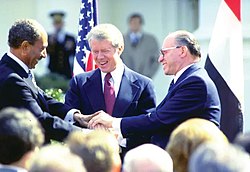Appendix:Gestures/handshake
Translingual[edit]


Etymology[edit]
The shaking hands as a sign of a contract being closed has to be separated from the same gesture when meeting someone and signifying favourable disposition such as friendliness or politeness on greeting or gratulation after its having taken place, and other expressions of the primary affect of enjoyment, though signifying accommodating disposition, in the deal-making case visualizing further performance on a party’s side, is the general idea.
The contractual gesture is known to humanity cross-culturally since the beginning of records, so there is nothing empirical to trace it back.
It wasn’t until the 19th century however that a visually equivalent gesture was formalized as a prelude to any business contact around the globe by the expansion of the English, elsewhere acknowledged a foreign intruder well to its end: ”Le shake-hands anglais” had gained foot in 1860s France with the exception of the Royalists, while in Russia still nobody bar Anglophiles performed it.
The unequal distribution is mirrored in the often unnoted detail that the more eastwards one travels or lives in Europe, the less usual it is to turn to any present women for offering one’s hand—ever unheard in Russia, although not necessarily against etiquette. Gender in handshakes also provides material for a distinct story.
It was all around the place however then in the 1910s even in China, including its imperial court, already.
As a consequence of its emergence after that of nation states, this gesture has failed to find places in their legal systems, in terms of being normatively expected a part of any procedure, though some sectarians, by refusing to shake hands particularly with women, (i. e., Islamists,) raised doubts about their adherence to the generally accepted rules and subsequently flunked their appointments as officials of their Western European country, for which they would have to treat the legal subjects neutrally and with equality in mind (Art. 3 Basic Law FRG).
Curiously in contrast to the treatment of the everyday handshake as a given, the original implementation in any group of society, before the 19th century, has frequently be seen a sectarian peculiarity of free churchmen somewhere between Britain, the Netherlands and Germany. In the end the origin is lost within vulgar converse of the beginning of the early modern period.
The current fate of the gesture after the 2020 pandemic may have been rarefied to more festive occasions, replaced with verbalizations and understating nods in greeting contexts—but the history of gestures is too ephemeral for their being plotted in all their contexts.
Production[edit]
This gesture requires at least two people:
- The first person extends his or her open hand. Traditionally, in some cultures, the right hand is offered. If the right hand is being offered, then the palm is facing left. Their arm is somewhat bent and relaxed.
- The second person imitates the gesture, by using the same hand (i.e., right if the other person used their right hand) and clasping the hand of the other person, in a way that the thumb of one person interlocks with the space between the thumb and index finger of the other person. Both people shake it up and down a couple of times, and then release each other's hand.
Interjection[edit]
[handshake]
- Indicates that two people are willing to be polite and/or friendly and with each other.
- Indicates that two people are closing a deal, which is understood from the context.
- (chess) When one person offers a handshake in the middle of a chess game, it indicates resignation from the game; this gesture is used to allow the opponent to win.
- Synonym: Appendix:Gestures/tip over king
Derived terms[edit]
References[edit]
- Beaucamp, Guy (2023) “Wie wichtig ist Händeschütteln für unsere Rechtsordnung? [How important is shaking hands for our legal system?]”, in DVBl[1] (in German), number 7, , pages 383-389
- Roodenburg, Herman (1991) “The 'hand of friendship': shaking hands and other gestures in the Dutch Republic”, in A Cultural History Of Gesture[2], London: Polity, pages 152–189